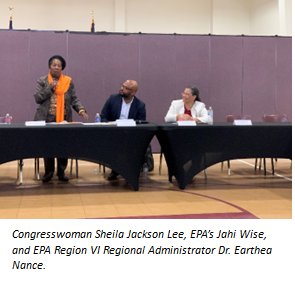Going ‘Way Bigger’ In Tackling Environmental Challenges In Houston’s Fifth Ward
By Adrian Shelley
On March 10, U.S. Environmental Protection Agency (EPA) Administrator Michael Reagan visited Houston’s historic Fifth Ward community with an important announcement.
 The EPA, a federal agency with an annual budget of about $10 billion annually, has $130 billion to spend. Much of the funding comes from the Inflation Reduction Act (IRA), the most significant legislation yet to address climate change, with $369 billion pledged to climate programs over the next decade.
The EPA, a federal agency with an annual budget of about $10 billion annually, has $130 billion to spend. Much of the funding comes from the Inflation Reduction Act (IRA), the most significant legislation yet to address climate change, with $369 billion pledged to climate programs over the next decade.
The IRA includes a $27 billion Greenhouse Gas Reduction Fund, consisting of a $20 billion General and Low-Income Assistance Competition to build capacity among “community-based organizations, small businesses, workers, suppliers and financial institutions.” Additionally, there is a $7 billion Zero-Emissions Technology Fund Competition for community solar and energy storage investment. Administrator Reagan was in the Fifth Ward to encourage residents to apply for these funds.
Also in attendance were EPA Region VI Regional Administrator Dr. Earthea Nance and Congresswoman Sheila Jackson Lee, who has represented the Fifth Ward community since 1995. Congresswoman Jackson Lee called the announcement the most significant government spending program ever announced in the Fifth Ward community.
Why Fifth Ward? The community has a long history of environmental challenges. Founded by formerly enslaved people in the 1860s, Fifth Ward is a historically black, working-class community. The community’s troubles began as early as 1895 with the opening of a railyard. The railroads treated wooden railroad ties with creosote and other chemicals. As early as the 1970s, residents of Fifth Ward and nearby Kashmere Gardens began noticing high cancer rates in their communities. In 2020, at the request of the Houston Health Department, the Department of State Health Services confirmed the existence of a cancer cluster. Since then, Fifth Ward residents, the city of Houston, the EPA, and local activists have advocated for the community to be cleaned up. The work is ongoing.
March 10, 2023, was a day for celebration in Fifth Ward. EPA Administrator Regan announced that the promised $27 billion in GHG reduction funding would be allocated in the next 18 months. Jahi Wise, the Acting Director for the GHG Reduction Fund Program, asserted that “community engagement is key to the design of this process.” Fifth Ward residents were assured they were being brought into the process at the beginning and that no money had gone out.
Indeed, much work is already being done in Fifth Ward. We heard about several active projects there and elsewhere in Houston’s disadvantaged communities. These included a collaboration between Solar United Neighbors and West Street Recovery to put rooftop solar on twenty low- to moderate-income homes in the next two years. In the Sunnyside community in Houston’s Third Ward, the largest urban solar farm in the country is taking shape—a 50 MW facility that will power from 5,000 – 10,000 homes.
Fully 40% of the EPA’s $130 billion budget is earmarked for environmental justice communities -— a commitment to the new Justice40 Initiative to direct funding to the communities that need it most. For the $20 billion General and Low-Income Assistance Competition, 55% of the funds will go to low-income communities.
Given the scale of the opportunity, Regional Administrator Dr. Nance encouraged residents of Fifth Ward to “think way bigger.” She suggested that the way to create big projects would be to “collaborate with local governments.”
This suggestion brought to mind our work with the Healthy Port Communities Coalition (HPCC), a decade-long collaboration that includes the Fifth Ward-based Coalition of Community Organizations (COCO) and Pleasantville’s Achieving Community Tasks Successfully (ACTS) (both of which are Hub Leaders for the Justice40 program).
In just the last few years, the HPCC has begun making inroads with the Port of Houston Authority, supporting, for example, their recently published Clean Air Strategy Plan and their Net Zero 2050 goal. Although Public Citizen does not accept government funding, we may look for opportunities among HPCC members to partner with the Port or other local entities to apply for GHG Reduction funding. The Port Authority has had several failed federal funding applications recently, partly because of a lack of deep collaboration with impacted communities.
Back in Fifth Ward, Administrator Regan encouraged residents to stay in touch, apply for funding, and continue their work to better their community.
“We don’t want the Railroad Company to beat us,” he said.
Adrian Shelley is the director of the Texas office of Public Citizen